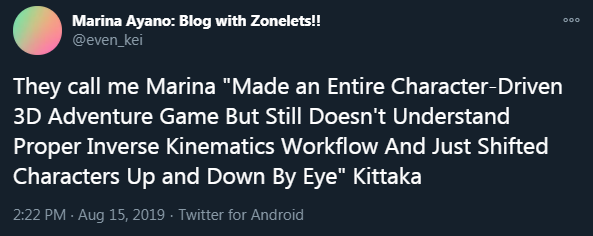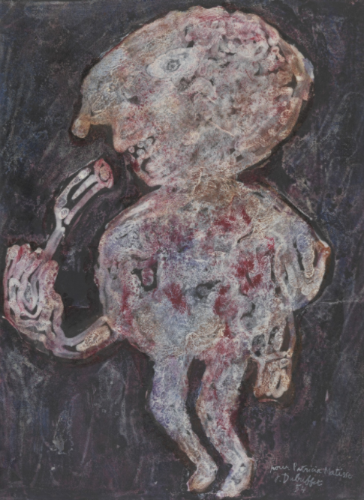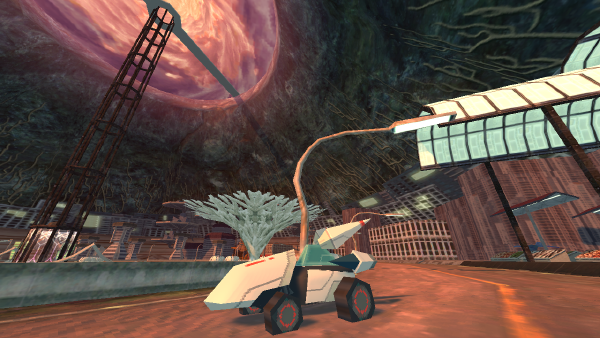Introduction
I want to talk about artistic skills and techniques, what we might call elements of craft. Picture with me, a dichotomy: professional, snobby, over-specialized, and corporate on the one hand and outsider, raw, approachable, and populist on the other. Does this ring a bell to you? Note, I'm not saying that this dichotomy is True, nor am I making claims about how many people subscribe to it. Mostly I'm suggesting that this dichotomy exists as a vibe, that people sometimes elevate or denigrate the vibe, and finally that the dichotomy itself is fundamentally misleading, limiting the value of any arguments for or against the vibe.
Let's get into some examples. Consider: the study of anatomy and perspective, the use/non-use of reference images, or "digital" vs. "traditional" art. Certain patterns play out: there is some orthodox methodology and debate ensues over whether that methodology is fundamental or exclusionary. There's a kind of relief, anti-establishment cred, or guilty pleasure that comes from flouting the "right" way of doing things. Here's me doing a kind of humble brag along these lines:

On the flipside there are of course plenty of people who will reiterate the importance of the fundamentals, and perhaps more importantly, art that clearly exhibits establishment forms of technical prowess will generally be broadly and easily celebrated.
Okay, so we've laid out this basic oppositional framework, and now I'm going to question it. First: the art world and many media industries are often very exclusionary, so of course there is some empowerment to be had in just pushing right back against that! But if we stop there, if we accept a "social media-fied" vision of what subversive craft looks like, then we flatten the conversation into making some sort of ethical judgement based on a few metrics. We lose some of our capacity to engage with the work's specificity. When scrappy art is good, it's good for reasons related to its own aesthetic qualities—not simply the absence of professionalism! (I think every so often about this quote from the Glorious Trainwrecks homepage: "It is not about unfinished, unplayable games. If any part of a glorious trainwreck is terrible, it is terrible in a way that is AWESOME.") But critical discourse tends to be developed communally, under the influence of industry and professional norms, so we may struggle to find words to engage with these aesthetic qualities. We may fall back on championing the scrappiness or anti-establishment nature of the work, when that is only the beginning of it.
Art Brut
From the Wikipedia page on mid-20th century French painter and sculptor Jean Dubuffet:
Influenced by Hans Prinzhorn's book Artistry of the Mentally Ill, Dubuffet coined the term art brut (meaning "raw art," often referred to as 'outsider art') for art produced by non-professionals working outside aesthetic norms, such as art by psychiatric patients, prisoners, and children. Dubuffet felt that the simple life of the everyday human being contained more art and poetry than did academic art, or great painting. He found the latter to be isolating, mundane, and pretentious, and wrote in his Prospectus aux amateurs de tout genre that his aim was 'not the mere gratification of a handful of specialists, but rather the man in the street when he comes home from work....it is the man in the street whom I feel closest to, with whom I want to make friends and enter into confidence, and he is the one I want to please and enchant by means of my work.' To that end, Dubuffet began to search for an art form in which everyone could participate and by which everyone could be entertained. He sought to create an art as free from intellectual concerns as Art Brut, and as a result, his work often appears primitive and childlike. His form is often compared to wall scratchings and children's art. Nonetheless, Dubuffet appeared to be quite erudite when it came to writing about his own work. According to prominent art critic Hilton Kramer, "There is only one thing wrong with the essays Dubuffet has written on his own work: their dazzling intellectual finesse makes nonsense of his claim to a free and untutored primitivism. They show us a mandarin literary personality, full of chic phrases and up-to-date ideas, that is quite the opposite of the naive visionary."
To me, Dubuffet illustrates both the impulse and the pitfalls of that impulse to center oneself around a supposed rejection of the Establishment. Back around 2012, I was an art major at a liberal arts college. I enjoyed learning traditional techniques, but my primary passions were video games and comics. I felt sort of guiltily incongruent moving through a fine arts program, and I had a hard time contextualizing myself within art history. I remember choosing to write a paper about Dubuffet, because he spoke to my frustrations with what I felt were omnipresent and arbitrary distinctions between High and Low culture.

Jean Dubuffet, Eater (Mangeur) 1954
Reflecting on Dubuffet in 2020, I'm supremely unimpressed. Here was a literal bourgeoisie wine merchant who dealt with his malaise by fetishizing the people from whom his class had extracted their wealth. Wikipedia also mentions that he boasted about making substantial profits by supplying wine to the Nazis, making his supposed admiration for the mentally ill ring even more disgustingly hollow. Seriously, fuck this guy. But even beyond his issues as a person, his supposedly "idealistic" and "humanistic" ideas just don't work. He imagines a working class everyman whom he wishes to "please and enchant" with his self-consciously un-intellectual art. As though working class men cannot take pleasure in thinking? As though all working class men must have compatible tastes in art? And how absurd and condescending to think that children and the mentally ill are not doing anything specific, social, or cultural with their art beyond "pure" expression. Like, I get it, the impulse behind Art Brut is probably relatable to many of us: the feeling that much of what is good about art is inevitably assimilated into (in the words of Dubuffet) "the game of a futile society, a fallacious parade." But for him, the end result is that "Art Brut" basically means: "I'm annoyed by my obnoxious insular community, so I have decided that literally all art that does not come from my obnoxious insular community is One Thing, defined by it's Purity, which is to say: how little it reminds me of my obnoxious insular community. Now I will proceed to gain clout within my obnoxious insular community by making this my shtick." Which... honestly hits a little close to home!
Our own bouquets
In my own experiences of artmaking on the fuzzy edge of the mainstream, there's sometimes a temptation to fixate on or play up my alt cred. But "alternative" to what? Doesn't it already cede too much ground to be inversely defined? I'm a very skilled artist. The skills that I have exist in a particular bouquet, which plays into the character of my work. We tend to become habituated to the smell of our own bouquets, so when we say "haha I don't even know how to do X" or "it's ok to not know Y!" we're often ignoring all of the skills that we are using! To go back to my tweet from earlier, while it is technically true that I didn't figure out the Blender inverse kinematics workflow for Anodyne 2, this was a part of a much larger picture. I was learning a lot of workflow very quickly, based on many layers of computer, art, and software expertise. And it was always the plan that Anodyne 2 would have a rough, bizarre art to complement its intended story and atmosphere—had I known then what I know now, the result might well have been weaker overall. Wielding the software learning process towards an aesthetic goal without getting lost in the weeds required experience, self-knowledge, directorial vision, and the support of Melos and various forums and internet-shared knowledge.

I say all of this not (just) to look cool, but to draw attention to how I might feel on one level that I'm flying by the seat of my pants, while on another level not be doing that at all. Or at very least, I am flying by the seat of very high-tech airplane pants, and so it's not really as mystical as it might seem.1 Bringing things back to the early examples, we might recontextualize the art of a person who has "not studied anatomy": we all build a particular understanding of anatomy throughout our lives, if for no other reason than by having and interacting with human bodies.
The following section in my Divest From the Video Games Industry essay seemed to resonate with people. It reads:
Sucking as praxis
“Professional artistry” as the capacity to maintain the shared illusion that there are indisputable measures of beauty and worth. When you allow the illusion to fail — often against your will — 1) capitalist powers will be disappointed in their inability to wield you with proper efficiency and 2) fellow small creators will be heartened because you bypassed the illusion and still offered something worthy. Failure in a backwards system can be strength. Growing as an artist can be a gloriously paradoxical affair.
Don't worry! I'm not taking back "Sucking as praxis"! I stand by the statement because it's kinda conditionally tongue-in-cheek, so it can hold up to some scrutiny. But I also don't want to just take the easy way out and make believe that I have some kind of post-quality infinite capacity to appreciate all human expression. Despite all of the ways that I like to problematize value structures, I actually do have very strong personal artistic opinions and I think most artists do! Which is to say I actually do feel on some deep level that some art meaningfully sucks and this doesn't wrap around to being radical (La La Land). Nor are these opinions incidental: they are a driving force behind my artistic practice! At the risk of taking a funny, nimble statement and explaining it into the ground, there are many different kinds of sucking aren't there? There's like just being unskilled in a very mundane way (and there's definitely a place for this!). There is the clueless, overexposed sucking of the rich and powerful. But separately, there is a realm where one feels sucky or feels perceived as sucky, but it arguably has much more to do with a mismatch of applied values and culture.
So how do we navigate all this without flattening? How do we avoid becoming modern-day Dubuffets, or Dubuffet-ing ourselves into easy-to-digest "diverse" or "countercultural" smoothies? I think it's by leaning into our specificity in a way that can only really be achieved by decentralizing the practice, consumption, and evaluation/celebration of art. Within smaller, overlapping circles, we might better develop critical language for understanding our practices beyond the dichotomies of quality vs. sucking, insider vs. outsider, indie vs AAA. I'm basically psyching myself up, because on some level it is hard for me to avoid the desire, like Dubuffet, to unlock the mystical capacity to be "for everyone" both in my art and in my personhood. And on the flipside—the pressure to be personally invested in everything alt, regardless of whether it aligns with my interests (I think this pressure makes a lot of "indies" grumpy). Instead, I hope we can grow in our capacity to artistically see and be seen, nurture and be nurtured, spar and be sparred with by people with overlapping enough interests and values that it actually feels relevant and nourishing.
Notes and related reading
Clarification of stakes
Response to a friend on twitter that I wanted to repost here in case it helps: It's sort of that exact confusion that i was trying to untangle, i.e there are infinite kinds of skill while only a few are canonized. So anything that flouts the canon enough is seen as "outsider" implying unskilled/anti-skill, when in reality, that art is good for reasons that are just as specific and craft-related (and the creators tend to care a LOT and want to improve their craft), but non-canon skills tend to be more difficult to communally discuss, so a mystification happens whereby those things are good because they are "punk". I think this makes it harder for new artists bc they are navigating an obscured field and must intuit the specific skills valued in a supposedly unskilled space.
I've never seen people saying Analgesic is not alt enough hehe... rather, the stakes for me are realizing more lately that the path to finding artistic peers/community is by learning how to better articulate the specific kinds of skills that I value—rather than relying on a generalized/mystified vision of alt and then feeling surprisingly uninvested.
Influences
I just started reading the book Other Hells by Claire Bishop (after Em Reed mentioned it in this blog post about art world abolition) and it helped to crystallize a lot of the feelings here. Bishop is discussing a specific strain of "participatory art", but I felt that a lot of the vibes of the discussion were applicable to other things. Take this for example (from page 26 of Other Hells):
In short, the point of comparison and reference for participatory projects always returns to contemporary art, despite the fact that they are perceived to be worthwhile precisely because they are non-artistic... All of this is not to denigrate participatory art and its supporters, but to draw attention to a series of critical operations in which the difficulty of describing the artistic value of participatory projects is resolved by resorting to ethical criteria.
Footnote
1 From the perspective of artistic encouragement and/or pedagogy, there's a tricky balance between presenting something as easy vs. difficult: ideally a learner should go into everything feeling that it's just easy enough to get started with but just hard enough that their struggles feel appropriate and surmountable. These are concerns that I juggled with regard to how I should present Zonelets, and I thought this was going to be a central theme of this blog post, but it kinda went off in its own direction and now this feels like more of a tangent. Ultimately, people have different interests and skills and so again the self-taught artist benefits from decentralization—a broader field of available visions and resources through which they might chart their personal path. More stones sticking out of the river to hop between.
Misc
Reflections on audience by jaime brooks, and a video clip of Fran Lebowitz
Getting High Off Your Own Supply by Liz Ryerson